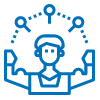
Head Start programs promote school readiness of children ages birth to five from low-income families by supporting the development of the whole child.
Head Start and Early Head Start programs offer a variety of service models, depending on the needs of the local community. Many Head Start and Early Head Start programs are based in centers and schools. Other programs are located in child care centers and family child care homes.
Some programs offer home-based services that assign dedicated staff who conduct weekly visits to children in their own home and work with the parent.
Through a positive learning environment and a variety of services Head Start programs support children’s growth and development, through:

Early Learning: Children’s readiness for school and beyond is fostered through individualized learning experiences. Through relationships with adults, play, and planned and spontaneous instruction, children grow in many aspects of development. Children progress in social skills and emotional well-being, along with language and literacy learning, and concept development.

Health: Each child’s perceptual, motor, and physical development is supported to permit them to fully explore and function in their environment. All children receive health and development screenings, nutritious meals, oral health and mental health support. Programs connect families with medical, dental, and mental health services to ensure that children are receiving the services they need.

Process: Each child’s perceptual, motor, and physical development is supported to permit them to fully explore and function in their environment. All children receive health and development screenings, nutritious meals, oral health and mental health support. Programs connect families with medical, dental, and mental health services to ensure that children are receiving the services they need.